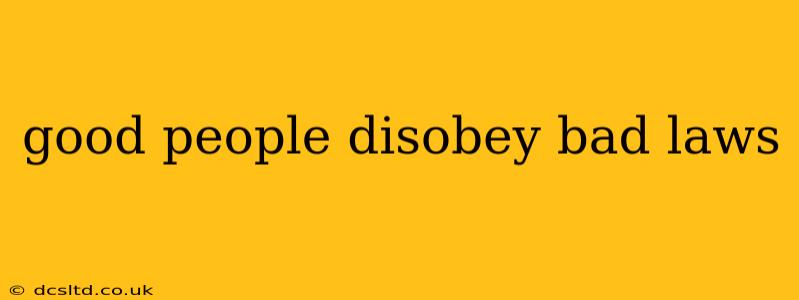The question of whether good people disobey bad laws is a complex one, deeply rooted in philosophy, history, and our understanding of justice. It's a question that has fueled revolutions, sparked social movements, and continues to shape our ethical considerations today. This exploration delves into the reasons why good people might choose civil disobedience, the historical context surrounding this phenomenon, and the potential consequences of such actions.
Why Do Good People Disobey Bad Laws?
The core reason good people disobey bad laws stems from a fundamental conflict between their conscience and the dictates of an unjust legal system. This conflict isn't taken lightly; it often involves significant personal risk and sacrifice. Several factors contribute to this decision:
-
Moral Obligation: Good people possess a strong moral compass that guides their actions. When a law violates their deeply held beliefs about justice, equality, or human rights, they feel morally obligated to resist it. This resistance isn't about personal gain; it's about upholding a higher moral standard.
-
Protection of Vulnerable Groups: Many instances of civil disobedience involve defending the rights and well-being of marginalized or vulnerable groups. Good people may disobey unjust laws to protect those who are unable to protect themselves.
-
Conscience over Compliance: Blind adherence to laws, even unjust ones, can lead to complicity in wrongdoing. Good people recognize this and prioritize their conscience over blind obedience to authority. They believe that true justice requires active resistance against oppression.
-
Promoting Social Change: Disobeying unjust laws can be a catalyst for social change. History is replete with examples where acts of civil disobedience led to significant legal and social reforms.
What are some examples of historical civil disobedience?
History offers countless examples of good people disobeying bad laws to effect positive change. These acts of defiance, often met with significant opposition, highlight the power of moral conviction:
-
The American Civil Rights Movement: The struggle against racial segregation involved widespread civil disobedience, from boycotts to sit-ins. Individuals risked arrest and violence to challenge discriminatory laws.
-
The Suffragette Movement: Women fought for the right to vote through various forms of civil disobedience, including protests, marches, and hunger strikes. Their actions challenged societal norms and legal restrictions.
-
The Anti-Apartheid Movement: Individuals across the globe defied laws supporting apartheid in South Africa, engaging in boycotts, sanctions, and protests to dismantle the system of racial segregation.
-
The Indian Independence Movement: Gandhi's philosophy of Satyagraha, or civil resistance, inspired widespread non-violent disobedience against British rule, eventually leading to India's independence.
What are the potential consequences of disobeying bad laws?
While the moral imperative is clear for many who choose civil disobedience, it's crucial to acknowledge the potential repercussions. These can range from:
-
Legal Penalties: Arrest, fines, imprisonment, and other legal sanctions are common consequences of breaking the law, even if the law is considered unjust.
-
Social Reprisal: Individuals who engage in civil disobedience may face social ostracism, job loss, or damage to their reputation.
-
Physical Harm: In some cases, those who disobey unjust laws may face violence or physical harm from authorities or other individuals.
-
Ineffectiveness: There's always a risk that acts of civil disobedience may not achieve the desired outcome. The change sought might not materialize, leading to disillusionment and frustration.
Isn't it important to follow the law, even if it's bad?
While respecting the rule of law is essential for a functioning society, a blind adherence to unjust laws can be morally problematic. The question isn't simply about following laws; it's about upholding justice and human rights. History demonstrates that challenging unjust laws, albeit risky, has often been necessary to achieve meaningful social progress. The ethical dilemma lies in weighing the potential consequences against the moral imperative to resist injustice.
How can one determine if a law is truly "bad"?
Determining whether a law is "bad" is a subjective process, requiring careful consideration. A law might be considered unjust if it:
-
Violates fundamental human rights: Laws that discriminate against certain groups or infringe upon basic human rights are inherently unjust.
-
Is disproportionately harmful to specific groups: Laws that disproportionately impact marginalized communities are often deemed unjust.
-
Lacks democratic legitimacy: Laws passed without proper democratic processes or that ignore the will of the people can be considered illegitimate.
-
Is applied unfairly: Even a seemingly just law can become unjust if it's selectively enforced or applied unfairly.
What is the difference between civil disobedience and other forms of lawbreaking?
Civil disobedience is distinct from other forms of lawbreaking in its intention and method. It’s typically non-violent, aims to challenge unjust laws rather than pursue personal gain, and is often accompanied by a public declaration of the reasons for the disobedience. This transparency and commitment to non-violent action are crucial distinguishing factors.
In conclusion, the decision to disobey bad laws is a deeply personal and ethical one. It requires careful consideration of potential consequences, a strong moral compass, and a commitment to social justice. History teaches us that while risky, such acts of defiance have often been crucial in advancing human rights and creating a more just and equitable society.
